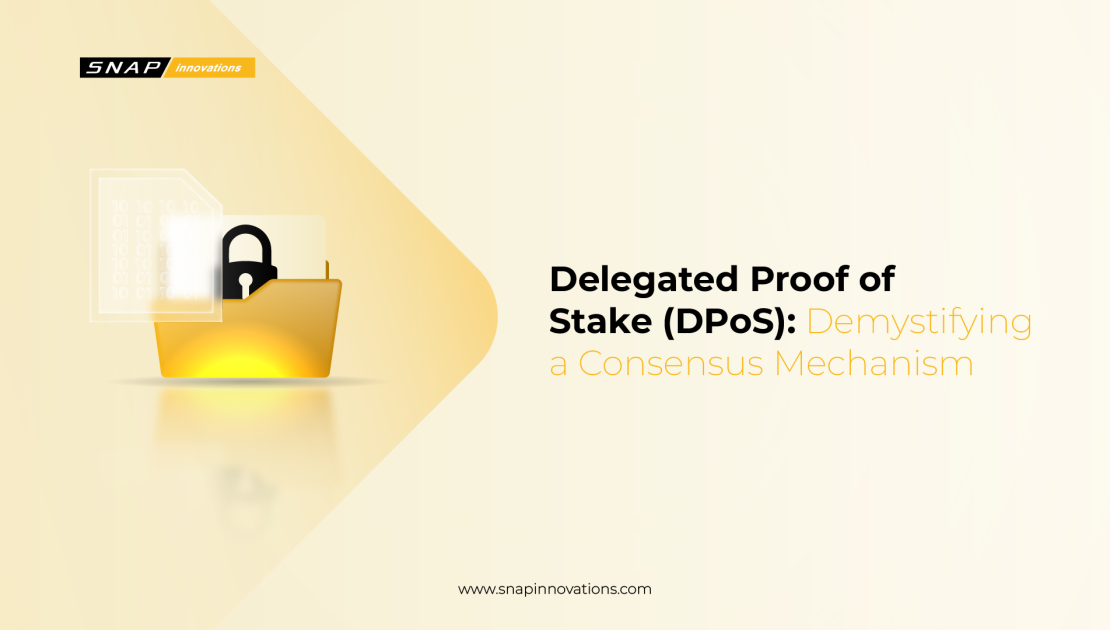In the ever-evolving world of blockchain technology, the concept of consensus mechanisms stands as a pivotal element. Among these, Delegated Proof of Stake (DPoS) has emerged as a noteworthy innovation, offering a unique blend of efficiency and democratic governance in blockchain networks.
This article delves into the nuances of DPoS, elucidating its workings, benefits, and implications in the blockchain landscape.
What is Delegated Proof of Stake (DPoS)
Delegated Proof of Stake (DPoS) is not just a technological concept; it’s a paradigm shift in how blockchain networks achieve consensus. It’s an innovative response to the limitations found in earlier consensus mechanisms like Proof of Work (PoW) and Proof of Stake (PoS). To understand DPoS thoroughly, it’s essential to grasp its context, functionality, and the role it plays in modern blockchain networks.
DPoS was developed as a solution to the inefficiencies and scalability issues plaguing earlier blockchain models. Traditional PoW, used by networks like Bitcoin, requires massive amounts of computational power to validate transactions and add new blocks to the chain. This not only leads to significant energy consumption but also limits transaction processing speed. On the other hand, the standard PoS mechanism, while more energy-efficient, raised concerns about wealth concentration and network control.
Also Read: Hedge Fund: A Comprehensive Guide
DPoS emerged as a middle ground, aiming to leverage the energy efficiency of PoS while enhancing democratic participation and scalability. It was designed to streamline the transaction validation process and reduce the centralization of power seen in other consensus models. In a DPoS system, token holders don’t directly participate in the validation process. Instead, they vote for a group of delegates – often a fixed number – who are then responsible for maintaining the network’s integrity. These delegates manage the blockchain’s ledger, validate transactions, and create new blocks.
The Evolution and Rationale Behind Delegated Proof of Stake
The evolution of Delegated Proof of Stake (DPoS) is a testament to the continuous search for more efficient, scalable, and democratic blockchain consensus mechanisms. Stemming from the foundational Proof of Stake (PoS) model, DPoS was conceptualized to address the inherent limitations in the earlier systems, particularly Proof of Work (PoW). PoW, while groundbreaking, posed significant challenges, notably its substantial energy consumption and limited transaction throughput, leading to scalability issues as seen in networks like Bitcoin.
In contrast, PoS improved energy efficiency but raised concerns regarding wealth concentration and potential network centralization, as those with larger stakes had greater control. DPoS emerged as a solution, refining the PoS concept by introducing a democratic layer where network participants vote for a select group of delegates to manage the blockchain. This approach not only retained the energy efficiency of PoS but also added a level of community involvement and governance, thereby democratizing the validation process.
The rationale behind DPoS was to create a system that could scale effectively, reduce energy consumption, and distribute network control more evenly among its participants, ensuring a more balanced and inclusive blockchain ecosystem. This evolution reflects the blockchain community’s commitment to improving network efficiency and governance, adapting to the ever-growing demands and complexities of blockchain applications.
How Delegated Proof of Stake Works: The Technical Perspective
 The following points elucidate the critical steps and components in the DPoS mechanism, each playing a distinct role in ensuring the network’s integrity, efficiency, and democratic governance.
The following points elucidate the critical steps and components in the DPoS mechanism, each playing a distinct role in ensuring the network’s integrity, efficiency, and democratic governance.
1. Token Holder Participation
The foundation of DPoS lies in the active engagement of token holders. Each holder’s voting power is typically proportional to their stake, allowing them to vote for a slate of delegates who will manage the network on their behalf.
This process not only empowers token holders but also ensures a broad representation of interests within the network. Unlike passive holders in traditional systems, DPoS participants have a direct impact on network governance, making the system more responsive to the community’s needs and concerns.
2. Delegate Selection
The selection of delegates is a dynamic and ongoing process, reflecting the real-time preferences of the network’s stakeholders. The most voted-for candidates assume the role of delegates, responsible for critical functions such as transaction validation and network security.
This method creates a competitive environment where delegates are motivated to perform efficiently and transparently to retain their positions. It’s a meritocratic system, where the best performers are rewarded with governance responsibilities, aligning their interests with those of the token holders.
3. Block Creation and Validation
Delegates play a crucial role in block creation, a process central to the functioning of any blockchain. In DPoS, each delegate gets the opportunity to create a block at a designated time, ensuring a fair and evenly distributed workload.
This method not only streamlines block production but also minimizes the chances of any single delegate gaining disproportionate control over the blockchain. The validation of transactions within these blocks is held to strict standards, ensuring accuracy and legitimacy in network operations.
4. Transaction Verification
Each transaction on the DPoS network undergoes rigorous verification by the elected delegates. This step is vital for preventing fraud and ensuring the integrity of the blockchain.
Delegates check for the legitimacy of each transaction, its compliance with network rules, and ensure that it hasn’t been processed previously (double spending). This verification process, while being thorough, is also designed to be efficient, maintaining the high transaction throughput characteristic of DPoS systems.
5. Block Broadcasting
After a block is successfully created and verified, it is broadcasted to the entire network. This broadcasting is crucial for maintaining the blockchain’s distributed ledger. Other nodes on the network then independently verify the block, ensuring a decentralized and collaborative approach to maintaining the blockchain.
This process, while adding an additional layer of verification, also reinforces the security and integrity of the blockchain. This additional layer of verification provided by the broader network solidifies trust in the blockchain, making it a reliable and secure platform for various applications.
6. Rewards and Incentives
The reward system in DPoS serves as a powerful incentive for delegates to perform their duties efficiently and honestly. Delegates are compensated for their work in block creation and transaction validation, usually through network tokens.
This incentivization aligns the delegates’ interests with the health and success of the blockchain. Furthermore, token holders who participate in the voting process often share in these rewards, creating a mutually beneficial ecosystem where active participation and good governance are encouraged and rewarded.
7. Security and Accountability
The DPoS mechanism inherently promotes a high level of security and accountability. Delegates, being elected by the community, are under continuous scrutiny. Their actions and decisions are transparent and subject to community review.
This setup creates a strong disincentive against malicious behavior, as any delegate not acting in the network’s best interest can be quickly replaced. This constant oversight ensures that the network remains secure and efficiently governed, making DPoS a robust and trustworthy consensus mechanism.
Delegated Proof of Stake in Action: Case Studies and Examples
 From powering high-volume transaction platforms to fostering community governance, these case studies illustrate the practical implications and successes of DPoS. Below, we explore seven distinct implementations of DPoS, highlighting how each project leverages this consensus mechanism to achieve its objectives.
From powering high-volume transaction platforms to fostering community governance, these case studies illustrate the practical implications and successes of DPoS. Below, we explore seven distinct implementations of DPoS, highlighting how each project leverages this consensus mechanism to achieve its objectives.
1. EOS.IO
EOS is one of the most prominent examples of a blockchain utilizing DPoS. Launched in 2018, EOS.IO was designed to support large-scale applications through its unique DPoS consensus mechanism. Unlike traditional blockchain networks, EOS can process a significant number of transactions per second, thanks to its efficient delegate system.
The network has 21 elected block producers who validate transactions and maintain the network, with token holders voting for these producers. This structure has allowed EOS to achieve remarkable scalability and speed, positioning it as a leading platform for decentralized applications (dApps).
2. TRON
TRON’s adoption of DPoS marks a significant shift in its approach to blockchain governance. With a focus on content distribution and digital entertainment, TRON relies on a system of 27 Super Representatives (SRs) elected by token holders.
These SRs are responsible for generating blocks and making decisions about network upgrades and governance. This approach has enabled TRON to handle high transaction volumes, crucial for its target market in the entertainment industry.
3. Lisk
Lisk is an application-focused blockchain that uses a modified version of DPoS. It has a fixed number of 101 delegates, who are responsible for securing the network and validating transactions.
Lisk’s DPoS system is noteworthy for its simplicity and ease of use, attracting developers who wish to build and deploy blockchain applications with minimal complexity. The Lisk network demonstrates how DPoS can be tailored to meet specific ecosystem needs, particularly in supporting developers and fostering application development.
4. BitShares
As one of the earliest adopters of DPoS, BitShares showcases the system’s potential for financial services and decentralized exchanges. BitShares uses a system where token holders elect a fixed number of delegates (witnesses) to oversee the network.
This setup has enabled BitShares to provide a high-performance platform for trading and financial transactions, demonstrating DPoS’s ability to facilitate complex financial operations on a blockchain.
5. Steem
Steem, known for its social blockchain that rewards content creators, also employs a DPoS mechanism. The platform elects witnesses to produce blocks, manage the blockchain, and implement changes proposed by the community.
This approach has been instrumental in creating a fast, scalable, and user-centric platform, where content creators and consumers actively participate in network governance and decision-making.
6. Ark
Ark’s implementation of DPoS focuses on user-friendliness and an inclusive governance model. Ark allows for a dynamic number of delegates, elected by token holders, who are responsible for network maintenance and block production.
Ark’s model is designed to be more inclusive, allowing for a broader range of participants in the consensus process. This inclusive approach underlines Ark’s philosophy of making blockchain technology accessible and easy to use for the average user.
7. Cardano’s Ouroboros
While not a pure DPoS system, Cardano’s Ouroboros protocol deserves mention for its unique approach, combining elements of PoS with a DPoS-like delegation system. In Ouroboros, token holders can either participate in the consensus process directly or delegate their stake to other participants.
This hybrid model aims to combine the security and decentralization benefits of PoS with the efficiency and scalability advantages of DPoS, illustrating an innovative approach in blockchain consensus design.
The Future of Delegated Proof of Stake: Trends and Predictions
 As we look towards the future, Delegated Proof of Stake (DPoS) is poised to play an increasingly pivotal role in the blockchain landscape, driven by ongoing innovations and the growing demand for scalable, efficient, and democratic consensus mechanisms. The evolution of DPoS is expected to be marked by several key trends and developments. Firstly, there’s a likely increase in the adoption of DPoS in newer blockchain projects, especially those requiring high scalability and active community governance.
As we look towards the future, Delegated Proof of Stake (DPoS) is poised to play an increasingly pivotal role in the blockchain landscape, driven by ongoing innovations and the growing demand for scalable, efficient, and democratic consensus mechanisms. The evolution of DPoS is expected to be marked by several key trends and developments. Firstly, there’s a likely increase in the adoption of DPoS in newer blockchain projects, especially those requiring high scalability and active community governance.
Also Read: What is Vertical Integration? Today’s Business Landscape
This trend will be bolstered by the growing awareness and appreciation of DPoS’s balance between efficiency and decentralized governance. Furthermore, technological advancements are anticipated to enhance the DPoS mechanism, potentially introducing more sophisticated voting systems and algorithms to ensure even greater security and fairness in delegate selection and network governance. Another significant trend could be the integration of AI and machine learning to optimize network management and decision-making processes within DPoS systems.
Additionally, as the global dialogue around energy consumption and sustainability in blockchain technology intensifies, DPoS, with its inherent energy efficiency, is likely to gain further traction. This trend might also lead to the evolution of hybrid models that combine the best aspects of DPoS with other consensus mechanisms, offering more tailored solutions to specific blockchain applications. Lastly, regulatory developments will likely influence the future of DPoS, as governments and international bodies begin to more deeply understand and potentially regulate how blockchain networks operate and are governed.
Conclusion
In conclusion, Delegated Proof of Stake (DPoS) stands as a significant innovation in blockchain technology, offering a unique combination of efficiency, scalability, and democratic governance.
While it presents certain challenges and is subject to ongoing debate, its adoption in various blockchain projects speaks to its potential. As the blockchain landscape continues to mature, DPoS is likely to evolve, potentially playing a pivotal role in the future of decentralized systems.


